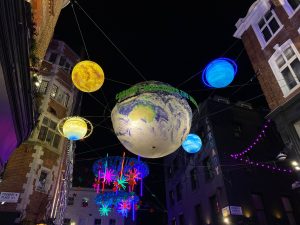HANS STOISSER
Roger Martin’s puzzle – a world of constant complexity?
It was almost in the last session of the 2-day Global Peter Drucker Forum in Vienna on November 15, 2013, when Roger Martin came up with a very different thought: The complexity of our world has actually not increased. It is just the unaddressed “inter-domain complexity” which makes us feel like everything has become more complex. Inter-domain complexity emerges as we have ever more specialized knowledge and, consequently, we do ever less understand the “broad world”. (See also Roger Martin’s HBR blogpost).
More complexity – an erroneous belief?
I was puzzled. Yes, human beings had always been confronted with change. The discovery of new lands, the first industrial revolution, introduction of electricity and telegraph, the new age of automobiles, and so on. Most probably, the individual always felt overwhelmed by new challenges.
But isn’t it different this time, haven’t knowledge society, globalization, and modern communication technology dramatically increased our interconnectedness and interdependencies? When bad mortgage loans in one part of the world are capable of bringing down the whole global economic system, isn’t that the consequence of an unprecedented dramatic increase in the level of complexity?
I resumed to my knowledge from systems thinking.
As I am part of an environment I always have to cope with an environment which by definition is more complex than myself. I do so by either increasing my own complexity (“variety” would be the exact term) or by decreasing the complexity of my environment (Law of Requisite Variety).
For example, I increase my own complexity by using a GPS navigation system and will be able to find my way to any address in Rio de Janeiro. Or I decrease the complexity of my environment, e.g. by just considering Austrian cities to go to. This means, in increasing my own complexity by using additional knowledge or modern devices I can become capable of taking advantage of a more globalized world. In contrast, decreasing the complexity of my environment helps me to simplify my life but generally deprives me of chances and opportunities.
Similarly, human mankind was able to cope with all those challenges arising from the discovery of new lands, the industrial revolution, electricity and telegraph, automobiles and so forth by increasing its own complexity. Navigation tools and maps, knowledge about other peoples, relevant knowledge as such, new forms of mobility and communication, new organizations, etc., have all been forms of increasing someone’s (a person’s, an organization’s, a country’s) own complexity.
The difference in the levels of complexity matters
Hence, I conclude that Roger Martin is right in the sense that the perceived complexity is not a new phenomenon. But it is the difference in the level of complexity (variety) of our own system (myself, my organization) compared to that of the environment which Roger Martin is referring to. Over time it might well have been that this difference hasn’t changed that dramatically.
However, in absolute terms our world is more complex than ever. Taking a systems science based definition – complexity expresses itself in variety and has to do with the number of possible states a system can adopt – more globalized and more interconnected mean that the interplay of ever more actors automatically increases the unpredictability and possible number of outcomes. Hence, a steady increase of complexity is an immanent phenomenon of human mankind’s development.
Read also:




Comment received to this post at Linkedin:
Interesting and thought provoking Hans, but ultimately I have to denounce Roger Martin’s opinion on the grounds that it is exactly absolute metrics that do matter and intensive variables have only served as instruments to support self-delusion.
Finland is surely proud of it’s energy intensity, but it is approximately equivalent to that of El Salvador – senseless metric?
Fuel consumption per kilometer or mile of a Hummer is far higher than that of a 1300cc car, but these 1300’s consume more fuel in total by orders of magnitude than the global Hummer fleet – senseless metric?
Complexity has increased in ways that we have not really comprehended yet and thinking otherwise is delusional (in my opinion).
Comment received to this post at Linkedin:
Complexity in our world has not changed? It surely has always been about how people see the world. Some people see the black and white while others see many shades of grey. The systematic thinking worker (e.g clerk) and the systemic thinker (e.g strategic planner). In Systems Thinking an evolution in the degree, and form, of systemic relationships that are recognised, and systemic implications more openly shared on issues in the social media.
Comment received to this post at Linkedin:
I would like to add to this. ‘Interdomain’ complexity has kept on increasing, because more opportunities are available in the ‘interdomain area’. Opportunities inside the domain have been used and exploited. And that has forced us to move more in the ‘interdomain’ function. Like the example of data analytics. Earlier it was the field of IT specialists. Then statistics got added to it. Then ‘business management’ domain, and now ‘psychology for consumer behaviour’ got added. And so on…